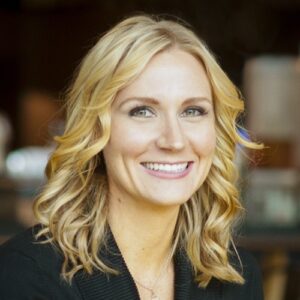05/03/2024
 Kyra Hughes, Business Development Director
Kyra Hughes, Business Development Director
With an extensive career exceeding two decades in the construction industry, Kyra has demonstrated exceptional leadership capabilities. She has effectively managed diverse teams spanning across Washington, Oregon, and Alaska for one of the nation’s premier AEC companies. Kyra’s expertise extends to pioneering the development of large-scale, intricate technology solutions tailored to the Pacific Northwest AEC market. Her strategic vision sets the tone and direction for delivering forward-thinking solutions and unparalleled service to clients. Kyra’s unwavering commitment places her at the vanguard of the ongoing transformation within the AEC industry.
Kyra answered six questions about her professional journey and what WIC Week means to her:
What is your role at Overcast? How did you get there?
I am currently the business development director for Overcast Innovations. I started my career in construction working as a PE and PM for a General Contractor. Through this experience, I gained valuable knowledge about the industry and how projects and project teams come together. Seeking new challenges after a decade, I transitioned into the building technologies sector where I spent many years specializing in sales/project development, strategic account management, and sales team leadership. The opportunity to join Overcast last year resonated with me, as it allows me to leverage my diverse experience to bring new and inventive products to the marketplace, that will transform the construction process and provide better outcomes for our clients and partners.
What attracted you to work in the construction industry?
I come from a long line of engineers, so it wasn’t really a question of whether I would become an engineer, but rather…what type. Through my collegiate studies and internships, I developed a passion for the built environment and the idea that I could make a positive impact in people’s lives by improving the places we live, work, and play, while at the same time reducing the impact of these spaces on our natural environment.
What does success look like in your role?
Across the industry, it’s widely acknowledged that there’s room for improvement when it comes to the design/construction process. My team is dedicated to fostering meaningful conversations across the industry, while showcasing practical examples of innovative thinking and what’s possible if we think beyond “business as usual”. A key measure of success, in my view, would be witnessing a market transition from costly, bespoke solutions in standard and highly repeatable spaces, to thoughtfully manufactured alternatives that integrate cutting-edge building systems and technologies, deliver optimal spaces for end-users, and forward the design team’s vision for the finished space.
What is the most rewarding thing about your work?
At Overcast, one of the most fulfilling parts of my role is collaborating with a remarkable team and exceptional industry partners who share our commitment to driving impactful change in an increasingly costly and complex industry. Through our collective efforts, we deliver superior solutions to our clients, while reducing cost and schedule risks and improving construction safety.
What does “Women in Construction Week” mean to you?
To me, Women in Construction week is a tribute of the remarkable women who have mentored, championed, and paved the path for women like me to build rewarding careers in this industry. It’s also a forward-looking celebration, embracing the potential of future generations of women in construction. It’s so important that young women see a place for themselves in this industry, empowering them to aspire to make meaningful impact over their own careers.
What do you hope to see for women in the construction industry in the future?
My hope for future generations of women in construction is that they won’t have to worry about any of challenges women today have likely faced at one point or another simply because we’re “women in construction” – that they won’t have to work twice as hard as their male counterparts to earn respect, that there’s not a seemingly finite number of seats at the table, that their opinions won’t be devalued simply because of their gender, that it isn’t a struggle to find quality role models who are excited to provide mentorship. Instead, in the absence of these challenges, I hope women in this industry will see themselves as instrumental in solving the broader, more significant challenges facing our industry right alongside our male colleagues. Only by embracing a diversity of perspectives, will we’ll be able to innovate and drive meaningful progress and lasting change.

